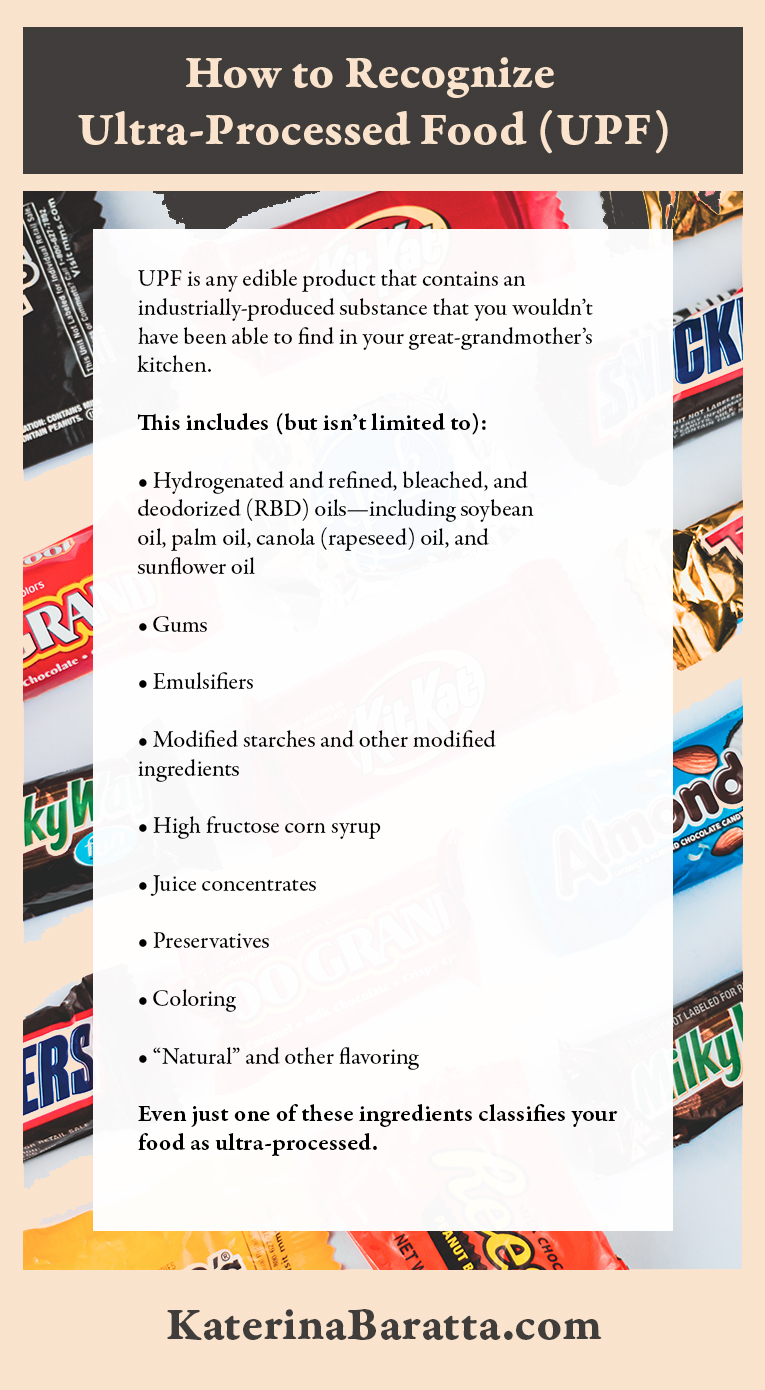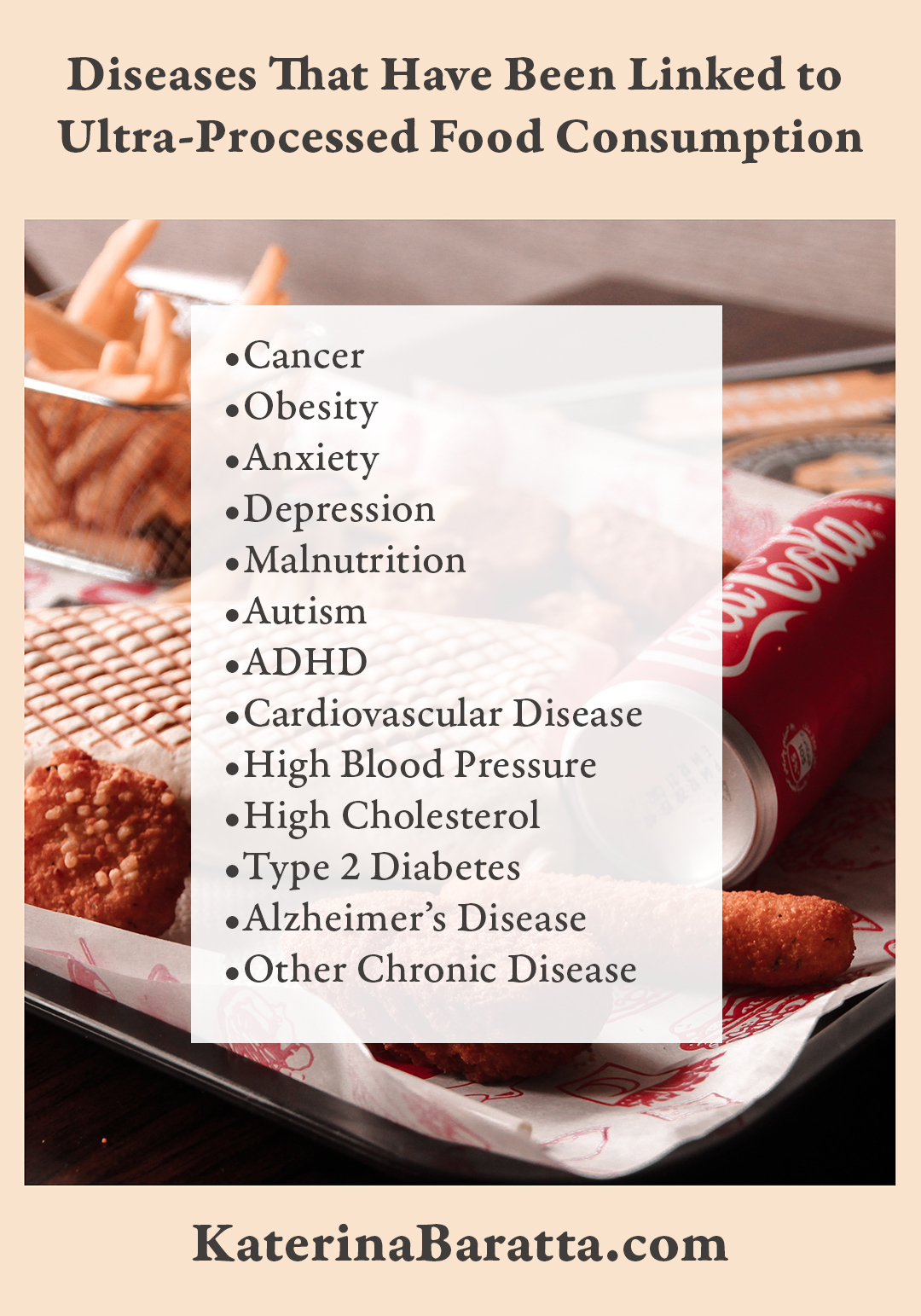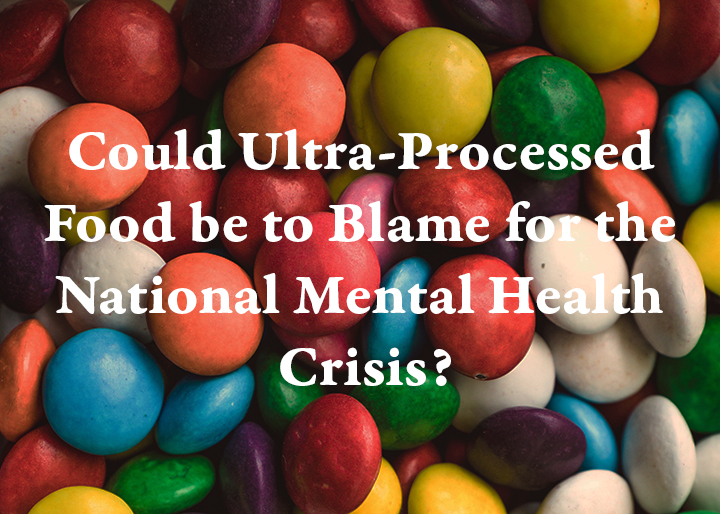Could Ultra-Processed Foods be to Blame for the National Mental Health Crisis?
In short, yes. At least partially. There is a clear link between ultra-processed food (UPF) and mental health.
It’s no secret that mental health issues are on the rise. The rates have declined a smidge since their peak during the pandemic, the data is still alarming.
In 2023, almost a third of U.S. adults reported symptoms of depression or anxiety. 8.3% of U.S. adults experienced a major depressive episode in 2021, up from 7.2% in 2018. Prescriptions for anxiety and depression now account for 10% of all medications prescribed in the U.S. (1, 2, 3, 4, 5)
What’s going on here?
There are many theories about what’s causing this uptick. The most commonly cited include loneliness, social media, loss, economic and career instability, systemic racism and oppression, lack of access to care, and poverty. (6, 7)
Each of these factors alone have filled entire sections in libraries and inspired countless studies.
But one thing that hasn’t gotten nearly enough attention from doctors or the media is the fact that when UPF consumption goes up, so does the likelihood of mental health issues.
Before we can get into the link between ultra-processed food and mental health, however, we need to clarify what ultra-processed food is, and why it’s so dangerous.
In this article:
- What is ultra-processed food?
- What’s the difference between processed and ultra-processed food?
- Why is ultra-processed food so dangerous?
- Could fat, sugar, salt, and the lack of other nutrients be the real issue?
- How does ultra-processed food affect mental health?
- What can you eat to support mental health?
- What we do and don’t know
- Next steps
What is ultra-processed food?
The full formal definition of UPF is many pages long, but basically, ultra processed food is any edible product that contains an industrially-produced substance that you wouldn’t have been able to find in your great-grandmother’s kitchen.
Ultra-processed food includes:
- Hydrogenated and refined, bleached, and deodorized (RBD) oils—including soybean oil, palm oil, canola (rapeseed) oil, and sunflower oil
- Gums
- Emulsifiers
- Modified starches and other modified ingredients
- High fructose corn syrup
- Juice concentrates
- Preservatives
- Coloring
- “Natural” and other flavoring

Even just one of these ingredients classifies your food as ultra-processed.
Most packaged foods are ultra processed, even if they have labels like “all natural,” “organic,” “sustainably sourced,” etc.
Another thing you can look out for are packages that advertise that they contain “low fat” or “sugar-free” foods, which are almost always ultra processed.
What’s the difference between processed and ultra-processed food?
When we think of processed food, the first thing most of us think of are refined ingredients like white flour and sugar. But while it’s true that you’d be better off limiting your pasta and baked-from-scratch cookie consumption, these ingredients aren’t actually all that problematic.
Traditionally, Italians eat bread and pasta at every meal, French cooking is famous for its use of butter and cheese, yet neither of these cultures saw the rates of diet-related disease we see today.
Traditional processing, like grinding flour, fermenting sauerkraut, or cooking up a stew, are actually crucial for digestion because we’ve evolved to have such small digestive tracts relative to other animals.
This means we need to start breaking down (aka digesting) most of our food before we eat it. How? Through processing.
Ultra-processed food, on the other hand, messes up digestion.
Because most UPF has almost no fiber, it flows through the digestive tract too quickly and hormones can’t keep up. This means it takes a lot longer for the satiation signals to reach the brain, and the obesity rate has skyrocketed since the 1970’s as a result.
In fact, a recent study showed that we eat about 500 calories more on average when we eat a diet high in UPF than we would if we ate non-ultra-processed foods.
And this is intentional.
UPFs are engineered to keep you coming back for more, because that’s how the companies that produce them make money.
To make matters worse, the UPF industry is one of the leading causes of declining biodiversity and the second largest contributor to global emissions, (Tulleken, 2023).
(BTW, body weight is only correlated with negative health outcomes, it is not a cause. There are individuals who exercise regularly and happen to have larger bodies, and they exceed their skinnier, non-active counterparts in all health measures except the number on the scale.
BMI was developed by a statistician and adopted by insurance agencies because of the correlation —not causation—between male body weight and heart-attacks, but it cannot accurately predict health outcomes on its own.
That said, if you eat a diet high in UPF, you are much more likely to gain weight and fall into the “obese” category and experience other health issues.)
Why is ultra-processed food so dangerous?
“A vast body of data now supports the hypothesis that UPF damages the human body and increases the rates of cancer, metabolic disease and mental illness,” (Tulliken, Ultra-Processed People: The Science Behind Food That Isn’t Food).
In fact, poor diet now kills more people globally than tobacco, and may be playing a large part in the mental health crisis we are experiencing, entirely thanks to UPF. (9)
UPF is dangerous because it is not actually food. A better term for it would be “industrially produced edible substance.”

According to Tulleken, humans have only been eating these products since about 1869, when Napoleon III offered a prize to anyone who could produce a cheap substitute for butter. Since then, chemists have extracted, refined, bleached, and manipulated previously inedible substances like the by-products of cotton and coal to make them both palatable and shelf-stable.
Of course, the addition of salt, sugar, and fat make these substances more appetizing (and often addicting.)
But just because something is edible doesn’t mean it counts as food.
Could fat, sugar, salt, and the lack of other nutrients be the real issue?
Ultra-processed foods are famous for high levels of salt, sugar, and fat, but that’s not the only reason they’re dangerous.
You could actually eat a diet made entirely of UPF and meet all of your nutritional requirements—macronutrients, vitamins, minerals, fiber and all—and still see negative health outcomes, even when all other factors are controlled.
In fact, a large study published in the British Medical Journal found that the proportion of UPF consumed is directly linked to the likelihood of cancer, so if you eat 10% more UPF, you’re 10% more likely to develop cancer. (10)
The problem isn’t nutrition. The problem is fake food.
How does ultra-processed food affect mental health?
The most well-supported theory of why UPF increases the likelihood of mental health issues—alongside a long list of physical health issues—is that UPF changes the gut microbiome and increases inflammation. (11)
Although the science is still in its infancy, the link between gut health and brain health has been clearly established.
When your gut microbiome is healthy, you have a few billion favorable bacteria in your digestive tract that help to regulate your digestion and play an important role in nutrient extraction, absorption, immunity, and disease prevention. (12)
Healthy gut microbes are also essential for mental health.
They are responsible for the creation of approximately 95% of the body’s serotonin, and they send signals to the brain via the vagus nerve, affecting the release of neurotransmitters like GABA, melatonin, and acytlecholine. Short-chain fatty acids produced by gut microbes also help to regulate brain homeostasis, which is required for proper brain development, and is also involved in behavior modulation. (13)
Evidence is mounting that UPF throws this delicate and vital ecosystem of the gut microbiome into chaos.
UPF introduces foreign bacteria into our gut microbiome and simultaneously doesn’t feed the favorable bacteria, so the “bad guys” start to take over.
This dysbiosis leads to increased systemic inflammation, and is directly related to increased stress, anxiety, depression, and other mental health issues. (14, 15)
Related: 9 Ways to Improve Gut Health
Foods that support mental health
Luckily, you can also eat in a way to support your mental health.
The first step is to become aware of the UPFs in your diet, and reduce them as much as you can.
You might also want to start observing your reactions to different types of foods.
Many people are sensitive to certain types of ingredients without even realizing it, and if you eat too much of the food that you’re sensitive to, it can also contribute to mental health issues.
The most common culprits to look out for are dairy, gluten, alcohol, caffeine, eggs, soy, nuts, shellfish, and nightshades.
But different things are healthy for different people in different amounts at different times in their lives, so just keep noticing the subtle shifts in your mind and body, try to identify what’s causing those shifts, and adjust your course accordingly.
The next step is to incorporate more real foods into your diet that support a healthy gut and promote a calm nervous system and clear mind.
Medical traditions like Indian Ayurveda, Chinese medicine, and ancient Greek medicine all recognized the link between food and both mental and physical health, long before UPF were even invented.
Entire books have been written on this topic, and the nuances are beyond the scope of this article, but the basic guidelines are pretty straight-forward.
“Eat real food. Not too much. Mostly vegetables.” -Michael Pollan
Simple, fresh, warm, whole foods, cooked with herbs and spices, have long been considered to be the most nourishing foods for both the mind and body.
Traditional cultures from around the world thrived on diets comprised of kitchen-processed ingredients like whole grains, legumes, vegetables, fruits, nuts, seeds, naturally-derived fats, fermented foods, and occasionally, small amounts of meats from wild and pastured animals.
For anxiety, more grounding, naturally sweet, and moist foods are most helpful.
For depression, invigorating herbs and spices are almost always prescribed.
In all cases, routine, connection, intellectual consumption (what you’re taking in through your mind,) and regular movement (preferably outdoors) are also recommended.
Precise recommendations depend on your unique circumstances and mind-body constitution.
In my practice, when I see people who present with more dry symptoms, for example, I recommend ingredients and medicinal herbs that will help to lubricate their system. If someone comes to me with a lot of heat symptoms, we’ll incorporate foods and lifestyle factors that vent that heat and cool them down.
If you’d like to learn more about your personal mind-body constitution so you can learn the foods, medicinal herbs, and lifestyle adjustments that will specifically support you, send me an email to set up a free consultation and learn more about working with me.
Related: Sign up for Holistic Mental Health and Wellness Sessions
What we do and don’t know
We know that UPF is made of substances that were previously inedible, until recent chemical advances manipulated them to resemble real food.
We know that these chemical manipulations are motivated by an industry that wants us to eat more so more products can be sold, and the development of these shelf-stable products has no regard to the impact on human health.
We know that these products have undergone very little testing before becoming available on the market.
We know that we have seen a staggering increase in obesity, autism (16), type 2 diabetes, heart disease, anxiety, depression, and other mind-body health issues, directly proportional to the amount of UPF people eat.
We know that when people have the education, money, energy, and time to choose healthier foods, they generally do.
What we don’t know is how much—if any—UPF is safe to eat.
We also don’t know the effects UPF have on fetal or childhood development.
There haven’t been enough studies to determine whether UPF consumption is to blame for the rise in ADHD rates we’re seeing, and we don’t yet know how much UPF consumption is linked to other conditions like food allergies or OCD. (17)
Next steps
I thought my family and I ate well, and relative to most Americans, we do.
As a very privileged, white, over-educated, licensed natural health practitioner, married to a former organic vegetable farmer who also holds a masters in holistic nutrition.
I know nutrition. I have taught nutrition to doctoral students. Holistic nutrition is one of my biggest passions in life.
But when I was introduced to Dr. Chris van Tulleken’s book, Ultra-Processed People: The Science Behind Food That Isn’t Food, I was shocked.
It’s hard to believe just how big the negative impact of ultra-processed food is on human health, how pervasive the problem is, and how hard it is to avoid, yet this is what we’re dealing with.
My husband and I do our best to avoid packaged foods, especially those with refined ingredients. But with 2 small children at home and a desire to consume less animal products, we didn’t used to hesitate to buy soft sandwich bread, almond milk, hummus, tofu dogs, “all-natural” cereals, and the occasional package of frozen chicken nuggets.
After hearing Dr. Tulleken’s work, I started checking labels that I had never before thought to check, and I was dismayed to find ultra-processed ingredients in many of the products in our kitchen.
Even “whole-grain,” “organic,” and “sustainable” products that I had previously thought were okay, I found contained ingredients like citric acid, guar gum, sunflower and canola oil, putting them squarely in the ultra-processed category.
If I wasn’t fully aware of the problem, I thought, most people must be completely oblivious.
Meanwhile, rates of obesity, heart disease, diabetes, cancer, and mental health issues are rising at staggering rates around the world, and evidence is mounting that it’s because of ultra-processed food. (18)
Just like Dr. Tulleken, I believe that everyone has a right to be informed about the effects of what they’re eating, on both their physical and mental health.
Unfortunately, many people don’t have the luxury of time, money, energy, and access to choose the healthiest food options.
But my hope in writing this article is that it will at least start to build awareness, so those who can choose better are able to if they want to, and everyone—privileged or not—gets a fire in their belly to advocate for policy changes that will promote health instead of harming it.
So what can you do? Here are some suggestions:
- Vote with your dollar if/when you can.
- Check labels and avoid buying UPF.
- Support the people who are doing it right, like local organic farmers.
- Contact your local soup kitchen and find out if you can donate fresh, real food ingredients to support equitable access.
- Get involved in your local school board to get UPF out of school-provided meals.
- Contact your legislators to:
- Request that UPF be labeled so consumers can be aware of what they’re buying.
- Petition to have bright, enticing UPF marketing banned, especially when aimed at children.
- Demand that money is invested in independent studies to determine and clarify the exact risks associated with UPF consumption.
- Demand that food programs make fresh, real food available instead of incentivizing UPF.
And if you’d like to learn more about which foods will support your unique mind-body system, click here to set up a free consultation and learn more about Holistic Mental Health and Wellness Sessions.
I can’t wait to see where this takes you!
References:
- https://www.kff.org/mental-health/issue-brief/the-implications-of-covid-19-for-mental-health-and-substance-use/
- https://www.cdc.gov/nchs/covid19/pulse/mental-health.htm
- https://www.nimh.nih.gov/health/statistics/major-depression
- https://www.goodrx.com/healthcare-access/research/fills-for-anxiety-and-depression-prescription-drugs-rose-during-covid-pandemic
- https://www.cdc.gov/nchs/products/databriefs/db377.htm
- https://www.thenationalcouncil.org/news/lack-of-access-root-cause-mental-health-crisis-in-america/
- https://time.com/6249306/work-mental-health-crisis-life-changes/
- Ultra-Processed People: The Science Behind Food That Isn’t Food, by Chris van Tulleken. 2023.
- https://www.healthdata.org/news-events/newsroom/news-releases/new-study-finds-poor-diet-kills-more-people-globally-tobacco-and
- https://www.thelancet.com/journals/eclinm/article/PIIS2589-5370(23)00017-2/fulltext
- https://www.ncbi.nlm.nih.gov/pmc/articles/PMC7770142/
- https://www.ncbi.nlm.nih.gov/pmc/articles/PMC6351938/
- https://www.ncbi.nlm.nih.gov/pmc/articles/PMC6469458/
- https://scholar.google.com/scholar_url?url=https://www.mdpi.com/2072-6643/13/8/2710/pdf&hl=en&sa=X&ei=H5ckZbuEKI_5yATsroL4Bg&scisig=AFWwaeYv7V9LBCHrJoxr5b_IBDup&oi=scholarr
- https://www.ncbi.nlm.nih.gov/pmc/articles/PMC6835660/
- https://www.ucf.edu/pegasus/processing-risk-childhood-autism/
- https://www.mdpi.com/2072-6643/15/5/1254
- https://world-heart-federation.org/news/deaths-from-cardiovascular-disease-surged-60-globally-over-the-last-30-years-report/





